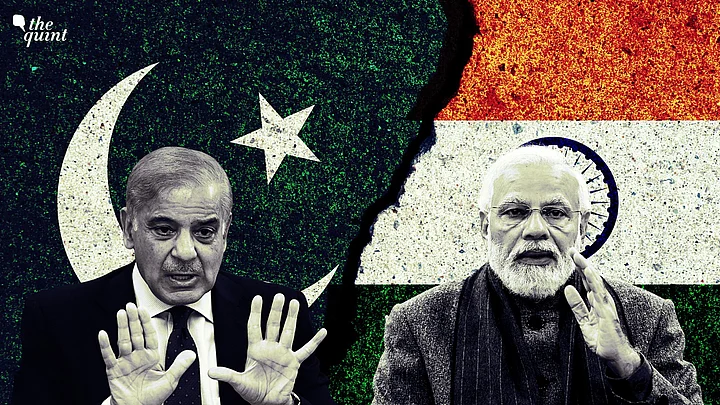To a long-term observer of India-Pakistan relations, Prime Minister Shahbaz Sharif’s interview to Al-Arabiya news channel on 17 January followed by quick clarifications and retractions by his office, could only bring about a sense of Deja Vu. It was reminiscent of the diplomatic, bilateral rhetoric undertaken by the political leaderships of the two countries in a bygone era.
In those days—say in the 1990s— while Pakistan’s army and its intelligence agencies were fully engaged in promoting terrorism in Jammu and Kashmir and elsewhere in India, its political leaders pointed to the immense advantages which would accrue to the two sides if a friendly and cooperative bilateral relationship could be established. Such an aspiration was immediately followed by several caveats. Naturally, the most important among them was the need for a resolution of the J&K issue and in a manner which Pakistan wanted.
Pak PM’s UAE Outreach To Mend India Ties
The venue of the interview—the United Arab Emirates—and its context—Sharif was in the ‘brotherly’ country, meeting his ‘brother’ UAE President Mohammed Bin Zayed (MBZ) to secure funds to save Pakistan from a macro-economic meltdown, was important to the points which the Pakistan PM made.
He clearly wanted to impress MBZ so much that he was willing to go the extra mile to save resources which Pakistan was expending on defence for development. Hence, his emphasis that Pakistan had learnt its lesson from the wars it had fought with India; which had only impeded progress and enhanced poverty.
Naturally, the UAE, Saudi Arabia, and even China are all tired of putting money down the bottomless pit that Pakistan has become. Along with International lending institutions like the IMF, they are putting immense pressure on Pakistani leaders to lead their country on the path of development and curtail defence expenditure.
With the exception of China, all other donors would like Pakistan to behave like a normal state and end its eternal confrontation with India. Thus, Sharif’s words were aimed principally at these donors.
In the past too, Pakistan too wanted to repair its ties with India but now with its continuing political instability along with deep economic distress, it was all the more essential for Sharif to make the right noises, especially when MBZ had opened the purse strings.
Pak’s J&K Card for Conflict Resolution
Ever since the constitutional changes in J&K in August 2019, Pakistan has maintained that talks with India cannot take place unless India reversed the steps it had taken. In the interview, Sharif departed from this position for he said that he was willing to sit down with Prime Minister Narendra Modi to discuss the resolution of the “genuine” problems between the two countries.
He also asked that the so-called violations of human rights in J&K were stopped by India and that autonomy was re-established. However, he did not make these conditions precedent for his meeting with Modi.
Thus, Sharif’s interview constituted a significant departure from the position which Pakistan had taken under Imran Khan with the support of the army under former Army Chief General Qamar Bajwa. This obviously riled his alliance partners—the PPP and Maulana Fazlur Rehman as well as the army which is now under a new Chief General Asim Munir.
Besides, 2023 is an election year and Sharif’s own party is under great pressure in Punjab. The last thing it can afford is a charge that it is willing to show weakness towards India. Hence, the only way out was for Sharif to revert to the old position that there could be no talks with India unless the decisions of 2019 were reversed.
‘To Mediate or Not To Mediate’
Sharif revealed in the interview that he had requested MBZ to mediate between India and Pakistan because he was his country’s brother who also had very good ties with India. This is part of Pakistan’s standard position of desiring third party mediation in India-Pakistan ties.
On its part, India’s long-established position is that all bilateral issues have to be resolved between the two countries and that third countries cannot play a mediatory role. There have been occasions though when other countries have acted as facilitators.
It is widely believed, and it has also been publicly indicated by UAE officials that their country got India and Pakistan together which resulted in the ceasefire along the Line of Control and the International Border in the UT of J&K on February 2021. That ceasefire has held and brought relief to the people inhabiting both sides of the LOC and the IB.
It is unlikely though if the UAE or any other country can change Pakistani attitude anytime soon because of the impending elections, and also because Asim Munir would not like to appear weak before the rank and file of an army which has been fed on a constant diet of India being their country’s permanent enemy.
It is not that Munir does not realise his country’s precarious economic situation for he too, has gone cap in hand to Saudi Arabia and the UAE. But only great leaders can ask their people to change course drastically and there is no leader of this ilk in Pakistan at this time.
Prime Minister Shahbaz Sharif also implied in the interview that as both India and Pakistan had nuclear weapons, the prospect of war was unimaginable. This is correct but he needs to persuade his army and Pakistan’s intelligence agencies that a country with nuclear weapons also should not make it part of its strategic doctrine as Pakistan has.
It is much too dangerous especially now that the Modi government in wake of the Pulwama terrorist attack, laid out the doctrine of preventing one if it concludes that preparations are being made to carry one out in Pakistan against India.
(The writer is a former Secretary [West], Ministry of External Affairs. He can be reached @VivekKatju. This is a personal blog, and the views expressed above are the author’s own. The Quint neither endorses nor is responsible for them.)
